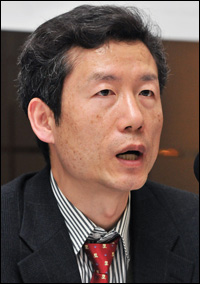Revolutionary thinker held in Chinese custody
Kim Young-hwan, one of four South Korean human rights activists held in China for 51 days so far, is a revolutionary thinker whose career has taken many dramatic turns.
During the 1980s he was part of a communist movement that attempted to overthrow a military dictatorship which seized power here at the start of that decade. He taught communist ideology to fellow activists and served jail terms for pro-North Korea activities.
But in later years, Kim became a harsh critic of the North Korean regime and determined to defeat it in order to help people there establish democracy.
In late March, he, along with three other South Korean activists, was arrested by the Chinese authorities in the northeastern city of Dalian, while working for democratic change in North Korea. The four have been denied access to a lawyer.
In a press release, the Seoul-based Committee for the Release of Kim Young-hwan said Kim declined to answer details about his situation at the detention center during a consular interview on April 26.
Asked about if there were any violations of his human rights, Kim was quoted as saying, “Can I say such thing (in the presence of the Chinese police)?” The committee said it is likely that Kim was under pressure from the Chinese authorities.
Kim’s change in political beliefs came after a rare meeting with the late founding leader of North Korea, Kim Il-sung at his mansion on Mt. Myohyang in May, 1991.
According to the book titled “Shadow of Progressives,” by fellow activist Han Ki-hong, Kim was taken there by two North Korean spies operating in South Korea in a submarine. He was then a student at Seoul National University.
During the one-on-one meeting, Kim Il-sung said he had read a series of notes written by Kim, “Letters from Kang Cheol.”
“The pieces were awesome. My eyesight is so bad that I had to read them through a magnifying lens,” the North Korean leader said.
Kang Cheol was Kim Young-hwan’s alias throughout the 1970s and 80s, when anti-government protests were in full swing here and many activists adopted pseudonyms to protect their identities.
The series of statements called for South Koreans to stand up against the authoritarian regime and establish an ideal communist state, describing the South as “a colonial state of the imperialist United States.”
Among them, the North Korean leader said, he was particularly intrigued by the part urging activists to fight against “U.S. colonialism.”
The leader of the “Hermit Kingdom” went on to say that he decided to talk with the South Korean student while resting in his mansion retreat, after being informed that he was actively spreading the “juche” (self-reliance) ideology at home. Kim Il-sung is credited as the architect of North Korea’s interpretation of communism.
Now 49, Kim Young-hwan recalled how the North Korean leader gave a lecture during the meeting, but did not listen to his audience. “Kim Il-sung appeared not to know much about the ideology,” he said.
The South Korean idealist’s 17 day experience of North Korea contained enough negative episodes to disillusion him.
Kim said the overall atmosphere of North Korea was hierarchical and gloomy.
“People I met there were dull and few of them were creative. Scholars repeated the same old stories and didn’t make any fresh points. I thought this is evidence that the research environment there is not free,” he said. “North Korean citizens were grim faced and their facial expressions showed their dark side. I tried to speak to a citizen in Pyongyang but a North Korean official, who was with me, asked me not to do so.”
Later, Kim showed signs of the shift in his stance toward North Korea in an interview with a progressive monthly magazine Mal in 1995.
“Under strict theoretical standards, I don’t think South Korea is a colonial state of the United States… We, South Koreans, need to have affection toward North Korean citizens, but need to be careful not to follow the North Korean regime,” he said.
In 1998, the activist officially said goodbye to his long-held, sympathetic leaning toward the North Korean regime by stating that the nation was gripped by “repression and the reign of terror.”
He further proposed that the South’s political left and right join forces to overthrow the North’s regime, by then under Kim Jong-il.
Since then, Kim has worked closely together with other activists for democracy in the Stalinist state and to liberate the repressed North Korean people. He underwent surgery in early 2000 after cancer was detected in his stomach. <Korea Times/Kang Hyun-kyung>


























































